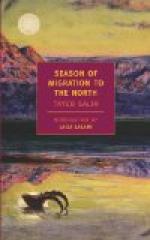[Illustration: A Bit of Fond du Lac]
These ultimate woods fascinate us, with their worn north trails of the trapper beaten as hard as asphalt with the moccasins of generations. The father of the Chipewyan down at the tents receiving his treaty money to-day and his grandfather before him trod these same trails and served The Company. Dusky feet trod these paths when good Queen Anne ruled in England, men made toilsome portages up these waterways, and here Crowfoot and Running Rabbit and Gaston Lamousette kept undisturbed the tenour of their way and matched wits with Carcajou the wolverine.
To the student who would read at first hand the story of fur, more interesting than dark otters, Hudson Bay sables, or silver-fox, one form silhouettes on the white canvas of the North. It is the figure of the Trapper. Here, as elsewhere, the man who mixes brains with his bait and makes a scientific art of a rude craft is the man who succeeds. It is a contest of wit worthy the cleverest. The animals, as the years pass, become more rather than less wary, and the days of the magenta string tying a chunk of fat to a nice new shiny trap are long past. The man who used to “make fur” in that way is, like Fenimore Cooper’s Indians, the extinct product of a past race that never existed.
The Chipewyan trapper eats at once, or dries for the future, every ounce of flesh he traps, from the scant flesh-covering over the animal’s skull to the feet and the entrails. As soon as the skins of beaver and musquash are removed, the bodies, so many skinned cats, are impaled on sticks of jack-pine and set sizzling before the fire. In the woods as in the camp, the laborious work falls to the woman. Lordly man kills the animal and that is all. With her babies on her back or toddling by her side, the wife trails the game home on hand-sled, and afterwards in camp she must dress the meat and preserve the skin.
The band of Fond du Lac Indians is the largest in the whole North, and they are perhaps the least unspoiled of “civilisation,” as their range is removed from the north-and-south route afforded by the Mackenzie. To-morrow the treaty party will leave, the skin tepees will be pulled down, and in those beautiful birchbark canoes whole families will be on the move. These people are essentially meat-eaters. Their hearts have not learned to hunger for those soggy bannocks, unventilated shacks, and sheet-iron stoves which are luring their tribal cousins on the germ-strewn way to higher culture with convenient stopping-places in the graves by the wayside.




